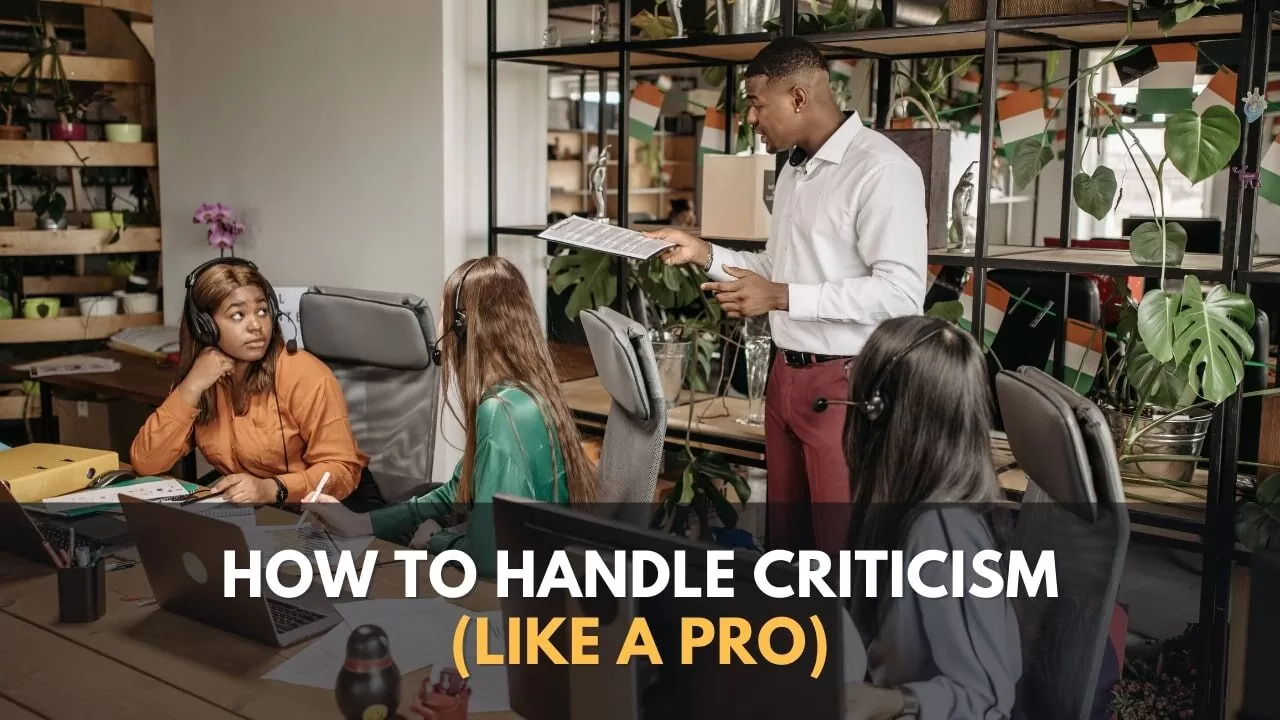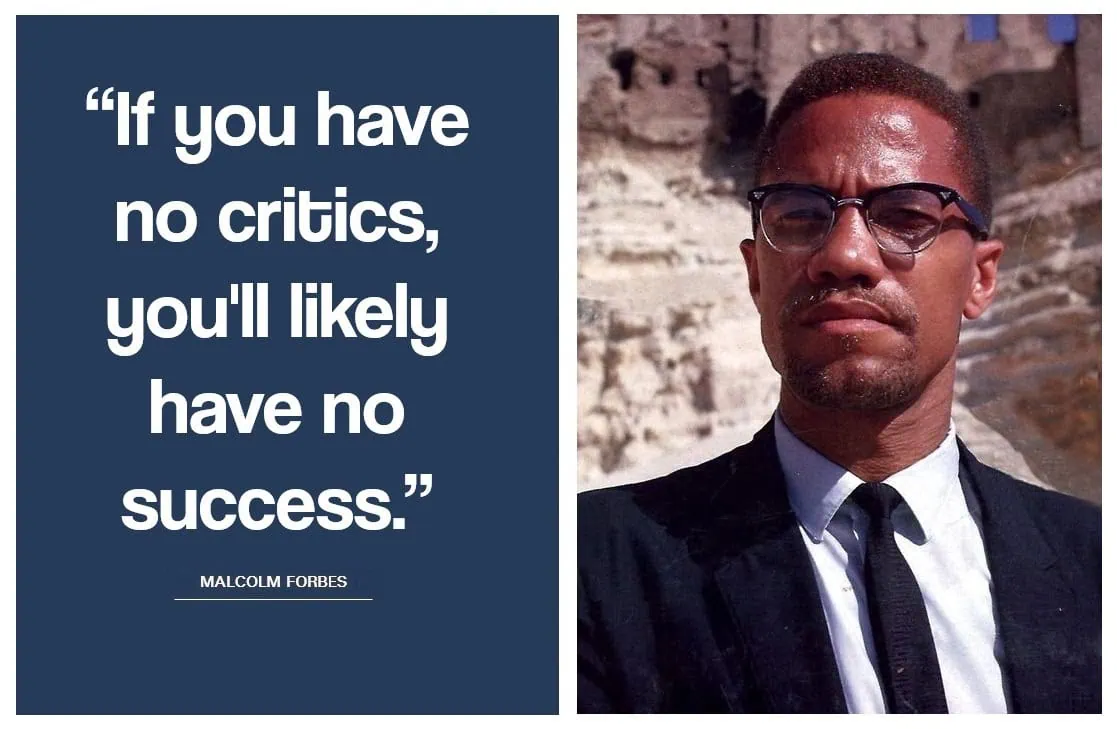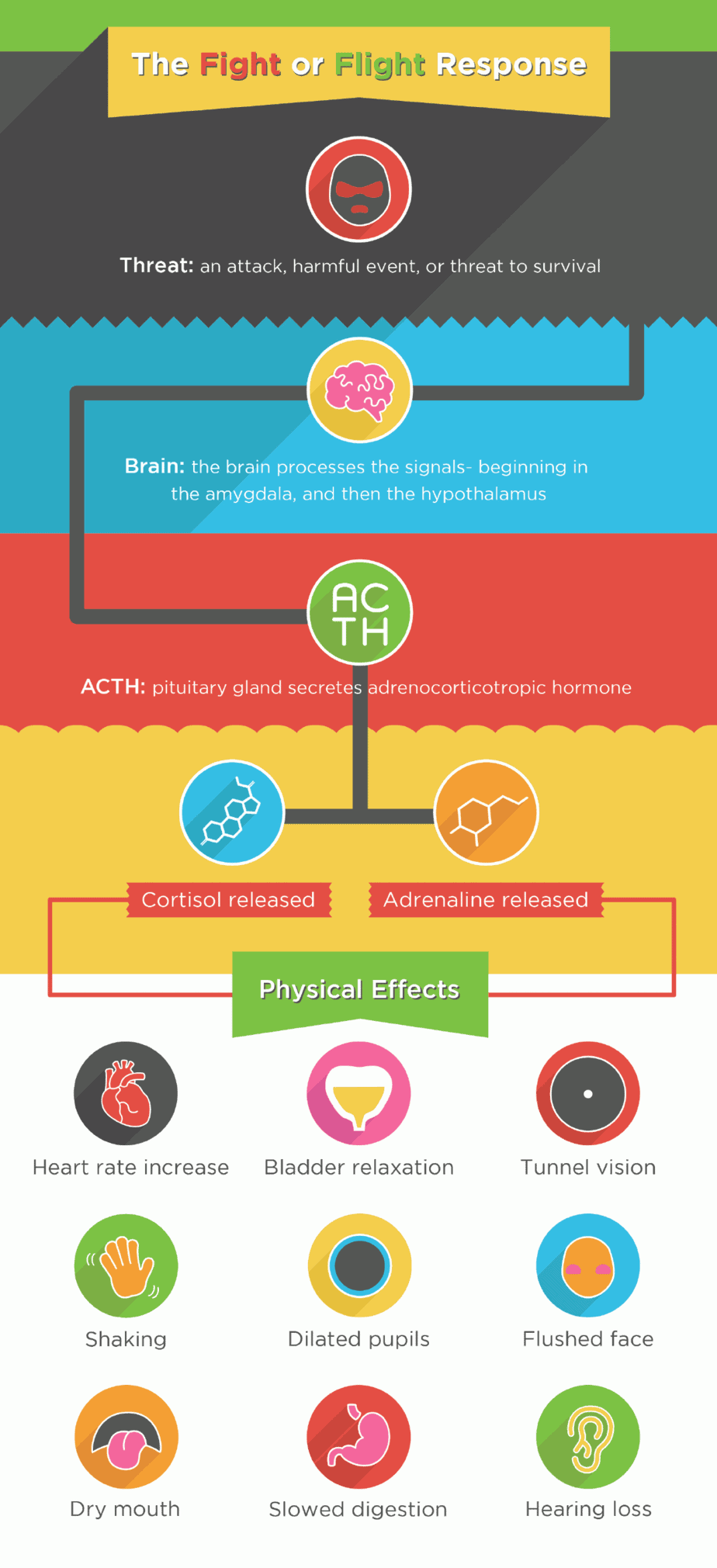Today's Wednesday • 13 mins read
Critics and social media are inescapable today. Both can be lethal. Trolls on the internet can wreck your day with a single emoji.
But the thing is:
- You can’t listen to only your critics, as people will always find something to whine about.
- And you can’t ignore all criticism, since some of them will be fair and helpful.
“If you have no critics, you’ll likely have no success.” — Malcolm X
The real problem is this: We instinctively see criticism as threats to our self-esteem and self-worth.
A critic’s words hangs over us like a personal dark cloud — spoiling our mood, focus, productivity, clarity, and optimism. We become defensive, dismissive, or even hostile.
So, how to deal with criticism positively, sorting the good from the bad?
10 Practical Ways To Handle Criticism Positively
Here are ten ways to handle criticism without negative reactions:
1. Get A Dress That Blocks Out Criticism.
Let me explain that with an anecdote.
There is a famous story about how McDonald’s trains its recruits:
- McD trains them to think that a customer’s insults are directed at their aprons, not at them.
- All harsh words get stopped at their apron, unable to reach their self-identity.
- Angry customers can’t hurt the emotions of anyone wearing that apron.
Use the same tactic to deal with criticism:
- Imagine your shirt shielding out all criticism.
- The poison in the words cannot get in to hurt your self-esteem or self-worth.
This sense of safety can prevent activation of your fear response. Now you can handle the content of the criticism calmly without getting triggered into fight-or-flight mode.
The deeper idea is this: Don’t Take Criticisms Personally.
- Don’t take criticism personally, because your position was criticized, not you.
- If you’re going to take everything personally, you will remain offended for most of your life.

2. Step Back To See The Bigger Picture.
Everyone seems to dole out this advice: Step back and try to see the bigger picture.
But it works. This is how:
- Cognitive Reappraisal: Stepping back lets you reassess the feedback more neutrally, as you can now see the situation separated from your emotions.
- Emotional Regulation: Criticism can trigger self-defense or distress. When you create some distance, you can calm down your initial strong emotions.
- Perspective-Taking: A step back helps you consider your critic’s viewpoint, grasp their motivations, and see the underlying context. You see it less as a personal attack and more as a scope for growth.
It works even better when you take a physical step back.
Neuroscience-wise, your primitive brain (amygdala and hypothalamus) interprets criticism as a threat. When you step back, the threat eases off, letting your rational brain (prefrontal cortex) take reins of the situation.
What to do after stepping back:
- Acknowledge your emotions and untie them from the feedback.
- Evaluate the situation objectively to decide whether it is valid and relevant.
- Reassess the threat level of the criticism, and identify the next actionable steps to improve.
It’s okay to explain to yourself, “I’m hurt”, “I’m angry,” or “I’m reacting too much.” “I can leave now and come back to this conversation later when I’m calm.”
Practice self-compassion and self-kindness.

3. Practice Ignoring Criticism.
Not every criticism is valid. Not every feedback qualifies for a response.
- If you receive an unhelpful or invalid criticism, you can freely choose not to respond at all.
- If you must, then politely tell them that you appreciate their input but do not agree with their perspective, so you won’t discuss it.
This sends the message that you will only respond to constructive and relevant feedback, and not get sidetracked by unproductive comments.
Practice saying “Thanks, but no, thanks” to refuse engaging with criticism. As Operant Conditioning (B. F. Skinner, 1948) says, behavior that is reinforced becomes stronger.
√ Useful tip: Ignore both the criticism and the critic. Next time you face a fault-finder, imagine they are talking to you through a mute button.
“Not every comment needs your attention, energy, or time.”
4. Respond With Novel Solutions.
While critics can be brutal, taking them head-on with a novel solution can change the course of history.
Perhaps, you know this story:
The metal keys in Steve Jobs’ pocket badly scratched the prototype iPhone’s plastic screen. He wanted a solution: “I don’t know how we are going to do it but, when it ships in June, it’s going to be glass.”
It led Corning Glass to introduce toughened glass as mobile screens.
[Whenever you think of Steve Jobs, remember his four magic words of advice!]
The key is to think of criticism as a springboard to build something new and better. Ask yourself, “How can I use this criticism to solve a problem?”
Think innovative solutions. Brainstorm fresh approaches. Ask unasked questions. Invite collateral thinking. Call unrelated people for parallel insights.
5. Leave, Think, Return.
Bite the bullet and excuse yourself from the situation. Don’t respond then and there.
This is the most important rule of handling criticism like a pro. However hard it is to accept, do not react at that moment. You may even tell them:
“I am getting triggered by your words. I need to move away from the conversation right now.”
Once you step away, take your mind off the criticism and do something relaxing. You may go for a brief walk around or do one of these things that would reset/refresh your mind.
When your mind opens up, process your emotions. Use logic to consider what they said, and return to carry the talk further.
This is the best advice for anyone wanting to know how to handle criticism positively: Leave, Think, Return.
Remember, while you can’t control what others will say to you or about you, you sure can work towards controlling how you respond. The key is to train yourself to respond, not react.
In fact, the Stoics know so well how true is this that they built the principle of Dichotomy of Control around it.
6. Stay Impersonal
If you’re going to take everything personally, you’re going to remain offended for most of your life. Instead, understand that it was your position that got criticized, not you. This makes you trust yourself back again to handle the situation better.
Be the guy in the arena who swears by Teddy Roosevelt’s words:
“It is not the critic who counts; … The credit belongs to the man who is actually in the arena, … and who at the worst, if he fails, at least fails while daring greatly …”
— Theodore Roosevelt
7. Deliberately Daydream.
Don’t let criticism seep too deep into your thoughts. Instead, use deliberate daydreaming as a mental escape.
Daydreaming involves imagining scenarios that are not real or present. It’s a common activity we do unconsciously. In fact, a large-scale study found that people spend an average of 47% of their waking time daydreaming (Gilbert & Killingsworth, 2010).
Purposeful daydreaming can create a mental distraction from the pain and overthinking of criticism. It can help you relax, reduce stress, and improve your overall well-being.
Here’s how to daydream:
- Find a Comfortable Space: Choose a quiet and comfortable environment, without distractions. This could be a cozy chair, a park bench, or even your bed.
- Set an Intention: Take a moment to set an intention for your daydreaming session. Decide what you want to focus on—whether it’s a scenario, a future goal, or simply a pleasant memory.
- Close Eyes and Breathe: Close your eyes and take a few deep breaths to center yourself. Inhale deeply through your nose, hold for a moment, and exhale slowly through your mouth.
- Visualize and Immerse: Let your mind wander deliberately. Start visualizing the scenario you’ve chosen. Engage all your senses—imagine what you see, hear, smell, and feel in this daydream. The more vivid and detailed your imagination, the more effective the experience will be.
- Reflect and Transition: After spending some time in your daydream, gently bring your awareness back to the present. Take a moment to reflect on how you feel and any insights you gained. When move back to your tasks or the situation that prompted the criticism, feeling more relaxed and centered.
8. Keep Your Cool
Most of us get upset when someone criticizes us. It is natural to want our opinion to be valued, so when someone disregards your opinion, it can feel like an affront.
However, regardless of how unpleasant the critique is, do not become enraged. Don’t respond to angry words with angry words.
Anger increases to uncontrollable levels as you spend more time with your critic. And people behave unpredictably when they are angry.
You may have heard of “crime of passion” (French: crime passionnel). It refers to a violent crime, especially homicide, committed in a fit of rage. In criminal law, it is a crime committed in the “heat of passion” in response to provocation, as opposed to one that was premeditated or deliberated.
So, don’t let yourself get provoked. And do not provoke them.
Learn how the Stoics control their anger.
9. Be Mindful Of Other Things
The urge to get others’ approval for our actions is innate, and it may become a major source of stress. Self-criticism, in particular, can cause us undue stress. People who have a higher self-criticism tendency feel more stressed after negative criticism.
Evidence from this study of adults who experienced traumatic events suggests that self-criticism and neuroticism are strongly associated with the presence of PTSD.
Stop seeking praise from everyone; you will wind up with a lot of criticism. Just live your life.
Mindfulness involves nonjudgmental awareness of our thoughts, emotions, and bodily sensations. Practicing mindfulness helps us respond to criticism with mindfulness, reducing stress and enhancing our ability to empathize with the critic.
Do not let the criticism seep deep into your brain. Shift your attention from words and the tone that are muddling up your thinking, and start to note things and activities that are on around you.
Learn how to be mindful of your immediate environment.

10. Respond to Criticism With A Positive Attitude
They say that no good deed goes unpunished, and this is especially true of constructive criticism. It’s easy to become defensive when someone gives you negative feedback. Instead of dismissing them or lashing out at their comments, embrace them as an opportunity to learn and grow.
Take criticism as a springboard for self-development. Stay positive and show them your positive attitude. Let them leave with the impression that you can take constructive criticism seriously and make improvements.
What does it mean to handle criticism positively?
The first lesson in handling criticism positively is to not take it personally and see every critical evaluation as a chance to grow. The path to your growth and success begins with criticism because critics can often see your blind spots. If you’re going to take everything personally, you’re going to remain offended for most of your life. – Anon”
We can always take positive feedback, and even negative feedback, as a signal that people are interested in helping us get better. It’s even worse when people notice you are doing a terrible job and do not say a word.
As the Stoic philosophers told us, we cannot control what others do or talk about us. What we can control is how we think about what they say. Then we can choose to discard it or internalize it, respond to it properly, learn from it, and apply it.
Always try to use criticism as a learning crutch. It can help you learn how others perceive you. It can also be a test of whether you can use it to improve yourself or your interpersonal skills. We can always learn from our mistakes. And in learning how to deal with the criticism for our mistakes, we can enrich our relationships with others.
Indeed, we can learn positive lessons from criticism if we are patient and ready to seek them out.
How does the body handle criticism?
The reason so many people can’t handle criticism, especially scathing criticism, is because it brings on their Acute Stress Response System into immediate play.
I can tell what happens to me when I face a particularly acerbic criticism. It comes as a hard slap on my pride, confidence, and self-esteem. Almost, it feels as if a 1,000-pound bull is hurtling toward me. Within an instant, my flight-fight-freeze response system jolts to action.
You may also call it my acute stress response. This is when my sympathetic nervous system goes on high alert. And it triggers the release of two chemicals — adrenaline and noradrenaline — by the two glands attached to our kidneys. Then starts a cascade of physical reactions.
Thereafter, what happens is this: the heart races, the face flushes, the pupils dilate, and the hands shake. Let me rush to add that this happens before I realize this is happening. It’s so fast.
Most of the time, this occurs in subtle ways. But when the criticism is high on the offensive, your flight-or-fight system kicks into full throttle. You are now a raging hulk of a monster truck, firing on all cylinders.

Here’s an interesting fact. When lab rats get threatened under controlled conditions, they do two things:
- Run to escape when there’s a way, or
- Rise to fight when there’re cornered.
Humans are not much different. In general, men respond to a perceived threat with aggression. While women respond by fleeing, seeking help, or trying to defuse the situation. But those are not water-tight rules for any gender.
How does the mind handle criticism?
When we’re presented with an idea we disagree with, the logic processing part of the brain shuts down. So, we’re unable to show a reasonable amount of rational behavior after a criticism.
We talked of body reactions. Now, what happens to your mind when it senses criticism as a threat to your self-esteem and self-worth?
- You shift focus to the negative side of yourself, and of the other person.
- Your self-respect gets dented, and a feeling of insecurity grips you.
- You lose respect for the other person and start to fear or hate them.
- Your reaction towards them is anxiety or anger-ridden, and you do things you later regret.
- You stonewall and helplessly absorb all the negative criticism in anguish.
In short, it makes you feel miserable.
One thing: Why do we remember a harsh criticism for a long time, but often forget generous praise? Because our brains are more responsive to threats than rewards.
Final Words
Criticism can be, well, upsetting, disheartening, and just plain mean. Most of the criticisms are biased, we know. And some people are critical by nature.
Still, not all your critics are there to find faults with you. Some will actually wish you well and want you to improve. You could learn from them and grow.
Let me repeat what Malcolm X said,
“If you have no critics, you’ll likely have no success.”
And there will be times when you are the one to criticize. For such times, always keep in mind this advice by the psychologists: Target the behavior, not the person.
√ Also Read: Why Is A Life of “No Regrets” Such A Bad Idea?
√ Please spread the word if you found this helpful.
• Our Story!